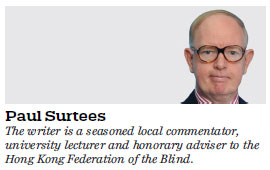Hard-sellers' tactics put off both visitors and Hong Kong people
Updated: 2017-06-21 07:39
By Paul Surtees(HK Edition)
|
|||||||
Hong Kong can realistically be looked upon as essentially a business city; certainly the needs of our local businesses are generally given every consideration by the special administrative region government. Sales are a vital part of most businesses but this article considers whether some locally used sales techniques go too far, even legally, and in fact can alienate potential customers.
I suppose that we've all had agents for tailor shops thrust into our hands their shop card as we walk in Tsim Sha Tsui (TST). Their persistent entreaties to get you into the shop, by following you along the pavement as they recite their sales pitch, would be more persuasive were they to wear well-tailored clothes themselves (from the shop), rather than the scruffy attire some of them adopt! Their very prevalence, in certain tourist districts such as TST, means that within a few hundred meters you are likely to be accosted by several irritating tailor's touts. That, itself, is off-putting and must be as counter-productive as are the window displays of poorly tailored suits in some of these shop windows!

Then there are those many imposter monks, whose begging bowls would perhaps ring with more donations were these supposed penniless divines not attired in quite such expensive sets of exotic monkish robes. These street beggars should be stopped, and sent back to wherever they came from - and in most cases, that will not be to a monastery.
Recent shocking cases of local beauty salons and gyms overdoing the hard sell to make customers sign up for more than they really want, or can even afford, have brought both types of organization into disrepute. The several cases so far coming to the public's attention are but the tip of the iceberg, for common anecdotal evidence suggests such inappropriately aggressive selling techniques are employed widely by many Hong Kong gyms, health centers, spas, nail bars and other beauty salons. All need to be better-regulated.
Then again, most of us must regularly have been at the receiving-end of cold call telephone sales pitches, often times for products or services in which we have not the slightest interest. What a waste of time this represents for all concerned. Again, better control of such conduct, by the authorities, would be welcome.
Outside - or even within - numerous MTR stations, on overhead public walkways, foot bridges, street corners and all along the central escalator in SoHo, leaflet distributors rudely thrust papers right under your nose, even if you don't want them. This waste of effort and paper is all-too-common here and again must deter quite as many potential customers as it attracts.
It is a fine thing for volunteers to help their charitable organization on their annual flag day, collecting donations by selling "flags" on the street. Indeed, I admit to having done this myself for charity from time to time. However, some exhibit the tendency to hang around in tight groups. Nobody is going to put a coin or banknote into more than one collecting box from that same charity, so they should avoid this counter-productive grouping and spread themselves out. Groups of too-eager flag sellers from the same organization sometimes completely surround a potential donor, which is most off-putting. Equally unseemly are the flag sellers who actively approach pedestrians who are already wearing their charity's stick-on "flag" label, having donated earlier, elsewhere.
Over-eager teenaged promulgators of social welfare organizations, animal welfare groups, political bodies, and more will often aggressively harry potential supporters by following them along the street, not taking no for an answer, in their quest to sign up more supporters. They thereby do their organization a severe disservice, upsetting many of the very people whom they want to bring on board. Such overly aggressive approaches should be banned from Hong Kong's streets.
Just recently, a group of us were invited on a private tour of a visiting luxury cruise liner. Unfortunately, however, and to the whole group's great disappointment, none of the special places on board that we had been promised (the bridge, engine room and a cabin) were included in our short and perfunctory tour. Instead, we were herded into the ship's theater for an hour's hard sell of their cruise program. Marketing is all very well but not when it is dressed up as a tour.
Those many organized tourist groups from other parts of Asia that are pushed and shepherded into particular shops by the tour organizers know only too well how unpleasant such a hard-sell approach can be. It gives a poor impression of Hong Kong and wastes their valuable time here.
We may wish good luck to Hong Kong's marketers but also wish that they would moderate their efforts, to avoid turning their sales pitch into an off-putting exercise for Hong Kong as a whole.
(HK Edition 06/21/2017 page8)